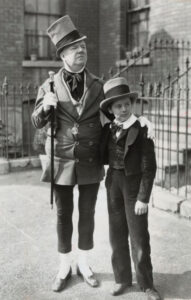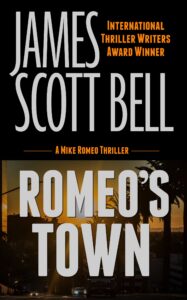by James Scott Bell
@jamesscottbell
I was reading a mystery the other day and noticed something—myself, pondering. I’d just read a passage describing a character. I shan’t print the actual prose, but here’s something I made up to give you the idea:
She wore a dress the color of jade. A platinum chain, deceptively thin on her smooth neck, held a diamond pendant. She had a sleek gold watch on her wrist, stacked against an array of jangling bracelets. Even her stiletto pumps whispered of indulgence and private fittings.
A couple of paragraphs later my brain sent me a message: Hey, I don’t remember a single thing she was wearing.
Which got me to thinking about what kind, and how many, physical details one should include. And my first thought is that one telling detail is much more powerful than a list. Consider this passage from The Godwulf Manuscript, a Spenser novel from Robert B. Parker:
Bradley W. Forbes, the president, was prosperously heavy—reddish face; thick, longish, white hair; heavy white eyebrows. He was wearing a brown pinstriped custom tailored three-piece suit with a gold Phi Beta Kappa key on a gold watch chain stretched across his successful middle. His shirt was yellow broadcloth and his blue and yellow striped red tie spilled out over the top of his vest.
This, IMO, is too much. And I was tripped up by broadcloth. What the heck is broadcloth? All those colors—red, white, gold. And what does “blue and yellow striped red” look like?
Here’s a better mix from The Americans by John Jakes. Carter Kent is a student at Harvard in the 1880s. Rebellious in nature, Carter got on the wrong side of his German professor.
In Carter’s opinion the man belonged in the Prussian army, not in a classroom. His curly blonde hair lay over his forehead in damp, effeminate ringlets. He had protruding blue eyes, and a superior manner, and loved to strut in front of his classes with a gold-knobbed cane in hand. He issued study instructions as if they were military orders, emphasizing them by whacking the cane on the desk.
Here damp, effeminate ringlets is striking. The gold-knobbed cane also. But here we have Carter’s impression of the man. Prussian army … military orders. And an action— whacking desks. That latter picture is one that sticks most in my mind.
Now let’s look at three character descriptions from the first page of Raymond Chandler’s The Long Goodbye. It is, of course, in the POV of Philip Marlowe:
The first time I laid eyes on Terry Lennox he was drunk in a Rolls-Royce Silver Wraith outside the terrace of The Dancers. The parking lot attendant had brought the car out and he was still holding the door open because Terry Lennox’s left foot was still dangling outside, as if he had forgotten he had one. He had a young-looking face but his hair was bone white. You could tell by his eyes that he was plastered to the hairline, but otherwise he looked like any other nice young guy in a dinner jacket who had been spending too much money in a joint that exists for that purpose and for no other.
Notice there’s one telling detail—bone white. That’s striking, and that’s enough. The rest of the description is the impression the character’s looks make on Marlowe.
There was a girl beside him. Her hair was a lovely shade of dark red and she had a distant smile on her lips and over her shoulder she had a blue mink that almost made the Rolls-Royce look like just another automobile. It didn’t quite. Nothing can.
Two specific details here—dark red hair and a blue mink—and both of them are wrapped up inside Marlowe’s impression. Here is a rich woman who doesn’t seem to care about the drunken Lennox (…distant smile…)
The attendant was the usual half-tough character in a white coat with the name of the restaurant stitched across the front of it in red. He was getting fed up.
Detail: white coat with red stitching. But the impression is what stays with us. I know what Marlowe means by a “usual half-tough character.”
Chandler then goes on to use both dialogue and action to augment the descriptions. Dialogue for the half-tough guy:
“Look, mister,” he said with an edge to his voice, “would you mind a whole lot pulling your leg into the car so I can kind of shut the door? Or should I open it all the way so you can fall out?”
Action for the woman:
The girl gave him a look which ought to have stuck at least four inches out of his back.
Finally, if you’ve got a character with a definite voice (and you should!) you can often capture the reader with just one line. Here again is the great Chandler:
It was a blonde. A blonde to make a bishop kick a hole in a stained-glass window. (Farewell, My Lovely)
From thirty feet away she looked like a lot of class. From ten feet away she looked like something made up to be seen from thirty feet away. (The High Window)
She smelled the way the Taj Mahal looks by moonlight. (The Little Sister)
Redoing the description that kicked off this post, perhaps:
A platinum chain, deceptively thin on her smooth neck, held a diamond pendant. I smelled trouble. Or was that her perfume?
Suggestions (not rules…ahem):
- Don’t give us a list. Look for that one, telling detail.
- Consider using an impression from the POV character.
- Augment the description with dialogue and action.
- Use the voice for all its worth.
Over to you now. As I sit here in my faded sweatpants the color of an old gray mare, and my L.A. Rams T-shirt with a hole in the left armpit, I wonder: Do you have the same reaction to lists of details (i.e., forgetting them almost immediately)? What is your approach to character description?






 George Horace Lorimer was the legendary editor of The Saturday Evening Post from 1899 to 1936. He brought the circulation up from a few thousand to over a million, and made it a place known for quality fiction.
George Horace Lorimer was the legendary editor of The Saturday Evening Post from 1899 to 1936. He brought the circulation up from a few thousand to over a million, and made it a place known for quality fiction. She put one hand behind her and flipped the snap of her halter and tossed it to the floor, staring at him with eyes of liquid smoke in which there was a curious and great disinterest. – From Here to Eternity by James Jones
She put one hand behind her and flipped the snap of her halter and tossed it to the floor, staring at him with eyes of liquid smoke in which there was a curious and great disinterest. – From Here to Eternity by James Jones conflict. This is usually the first lesson a young writer learns, and rightly so. No conflict, no story. No conflict, no interest. Maybe you can skate along for a page or two with a quirky character, but said character will soon wear out his welcome if not confronted with some sort of disturbance, threat, or opposition.
conflict. This is usually the first lesson a young writer learns, and rightly so. No conflict, no story. No conflict, no interest. Maybe you can skate along for a page or two with a quirky character, but said character will soon wear out his welcome if not confronted with some sort of disturbance, threat, or opposition.